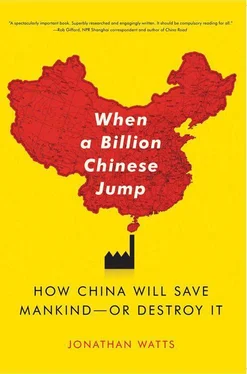23. Yue-Sai sounds naïve and self-deluding, but her self-justification has since been echoed by countless multinationals. When criticized for pandering to an authoritarian regime, the response is usually along the same lines as Yue-Sai’s: “Our products are opening China to the world. By selling we are doing good.”
24. Fraser Newham, “China Puts Its Best Face Forward,” Asia Times, April 6, 2006.
25. The Japanese firm Shiseido reportedly found that Chinese consumers want even more intense whitening agents than those in Japan (ibid.).
26. Leg lengthening is a painful and dangerous procedure in which surgeons break the legs and bolt either side onto a racklike device, which stretches the bones as they heal over months.
27. Yet, she is self-aware when she explains why Asian features require different makeup. “Being Chinese, we know that we look different from you in the West. I have black hair, dark eyes, a flat nose—I have a hard time buying sunglasses. My skin tone is yellow, my eyes are small and slanted so I try to make up differently.”
9. Why Do So Many People Hate Henan? Henan
1. Thomas Malthus, An Essay on the Principle of Population (1798), ch. 16.
2. In terms of registered population in 2008. Other provinces claim this title when measured in different ways. Guangdong would be top if migrants are included, Sichuan if Chongqing is included.
3. Ibid.
4. In the nineteenth century the American A. K. Norton wrote, “The numbers of the people must be cut down, and if disease, war and plague are not sufficient, famine may be depended upon to fill up the toll. Herein lies the paramount reality of the China problem” (cited in Jasper Becker, Hungry Ghosts: Mao’s Secret Famine [Holt, 1998], p. 11).
5. Qu Geping and Li Jinchang, Population and the Environment in China (Lynne Rienner, 1994).
6. Though the origins of tai chi are contested.
7. Hence the abbreviated name for the province Yu, a character depicting a person leaning on an elephant (Mark Elvin, Retreat of the Elephants: An Environmental History of China [Yale University Press, 2004]).
8. http://news.sina.com.cn/c/2009-01-23/071217101413.shtml.
9. Population density in Henan is 380 people per square kilometer ( National Statistical Yearbook 2008 [China National Bureau of Statistics, 2008]). It is the seventeenth-poorest province in China with an average rural income of 3,850 yuan in 2007.
10. The safety of planes is a high priority in China: many airports put up huge nets around the runway to stop birds from flying into aircraft engines. Conservationists say the nets are deadly, unnecessary, and no longer used in most developed nations (interview with John MacKinnon).
11. Here and in Sichuan, which was the most populous province until Chong-qing was made into a separate municipality.
12. Judith Shapiro, Mao’s War Against Nature (Cambridge University Press, 2001), p. 31. Mao also argued that “an extra belly was also two extra hands.”
13. The first people’s commune was established in Chayashan, near Xinyang city, in April 1958.
14. Wang Shilong’s stunning photographs of the province during that era capture the sense of communalism. In one, thousands of farmers are mobilized as hydroengineers, working in a honeycomb formation to dig vast irrigation channels. In others, workers toss fuel into the roaring fires of backyard steel furnaces and beaming farmers display giant cabbages and armfuls of wheat. Such idealized propaganda—backed by the “Good News Reporting Teams” of Maoist cheerleaders—masked a very different reality.
15. Becker, Hungry Ghosts, p. 272.
16. One in eight people in Xinyang died (Yang Jisheng, Mubei: Zhongguo 60 Niandai Dajihuang Jishi [Tombstone: A History of the Great Leap Forward], Cosmos Books, 2008).
17. Starvation and cannibalism have a long history in China. The same is true in many Western countries. But memories here are more recent. It is no coincidence that the most common question after saying hello even today is “Ni chi le ma?” (Have you eaten?). See also Becker, Hungry Ghosts, pp. 116, 118, for this and the remainder of the paragraph.
18. Henan’s apparent success in dam building was the inspiration for Mao to launch the Great Leap Forward, according to Ma Jun, China’s Water Crisis (Eastbridge, 2004), p. 149.
19. Becker, Hungry Ghosts, p. 77.
20. Mao was in a hurry to catch up with developed nations. Henan’s leaders were the most enthusiastic in feeding his delusions about the production gains that could be achieved. Other grandiose goals, “Let the River Waters Yield” and “Let the High Mountains Bow Their Heads,” started here and spread nationwide in this era.
The Henan Communist Party secretary Wu Zhifu tried to conceal the leader’s failures by restricting travel, locking up opponents, and ensuring the propaganda machine churned out stories of production gains and satisfied farmers. Anyone who dared to reveal that the harvest in 1959 actually declined—instead of more than doubling as the government claimed—was denounced as an enemy of the people. Wu’s hold on power was finally broken in 1961 when 30,000 PLA troops moved in, arrested the leadership, and distributed grain. By then, countless thousands had starved to death (Becker, Hungry Ghosts, p. 112).
21. Henan exported 21 million migrants in 2008, according to Xu Guangchun, Henan Communist Party secretary ( China Youth Daily, February 2009).
22. The Huai was the inspiration for the title of Elizabeth Economy’s The River Runs Black: The Environmental Challenge to China’s Future (Cornell University Press, 2004).
23. Ma Tianjie, “Environmental Mass Incidents in Rural China,” China Environment 10 (2008/9), Woodrow Wilson International Center for Scholars.
24. See http://maps.google.com/maps/ms?hl=en&ie=UTF8&oe=UTF8&msa= 0&msid=104340755978441088496.000469611a28a0d8a22dd.
25. About 11 percent of cases of cancer of the digestive system are attributable to polluted drinking water (World Bank and Chinese Ministry of Environmental Protection study, China: The Environmental Cost of Pollution, p. xiv).
26. Xiditou, with a registered population of 6,000, has a cancer rate of 2,032 per 100,000, almost fifteen times the national average (Mary-Anne Toy, “Waiting for Death in Fetid Cancer Villages,” Sydney Morning Herald, May 27, 2009).
27. Richard McGregor, “750,000 a Year Killed by Chinese Pollution,” Financial Times, July 2, 2007.
28. The World Bank estimates the cost of water contamination at 147 billion yuan, or about 1 percent of GDP per year.
29. In the mid-1990s—the period during which most people in China became infected—the central government was still dismissing HIV as a “foreign disease.” Even in 2003, when Beijing was starting to acknowledge the problem, Henan’s leaders were still in denial. AIDS experts, charity organizations, and foreign diplomats were either refused access to Henan or only allowed to enter under heavy restrictions. Journalists discovered in the area were kicked out immediately.
30. After flying to Zhengzhou, we checked into the hotel late at night because staff are then less likely to report the presence of foreign reporters to the local police (as they are obliged to do). The next morning, we left early and spent an hour finding a taxi with curtains so my Western face would not be spotted on the road.
31. Those who played the biggest part in exposing the disease—whistle-blowing doctor Gao Yaojie, the health ministry bureaucrat Wan Yanhai, and the young activist Hu Jia—were either harassed or thrown in jail. Efforts were also made to silence Yan Lianke. After three years visiting the AIDS villages undercover, he penned The Dream of Ding Village . The novel was to be his defining satire, a devastating critique of China’s runaway development, the environmental and spiritual horror story of a country that sold its blood along with its soul to foreign consumers. The book describes the collapse of the land and the people in painfully beautiful prose: “Days like corpses. Grass upon the plain gone dry. Trees upon the plain gone bare. Crops and fields withered, ever since the blood came. Ever since the blood ran red. The villagers, shrunken into their homes, never to emerge again.”
Читать дальше










